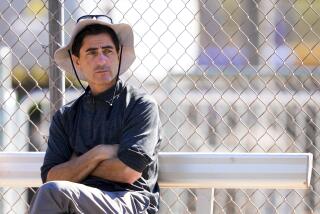Padre Manager Boros Keeping a Low Profile
- Share via
YUMA, Ariz. — According to the Steve Boros theory of managerial evolution, it shouldn’t have come to anyone’s surprise that he is the new manager of the San Diego Padres.
According to Boros, baseball managerial styles evolve in their own sphere on each team.
In case A, if someone has been a relaxed sort of manager and has failed, it’s a good bet his successor will be a tough, disciplinarian.
In case B, if someone has been a hard-nosed, no-nonsense skipper and things didn’t work out, it’s a good bet his replacement will be a more laid back, lower profile type of man.
In the Padres’ case, it was a classic example of case B.
Boros came aboard the Padre ship at the start of spring training with the resignation of fiery Dick Williams.
Unlike Williams, Boros believes too much credit is given to managers (and possibly too much blame). The Boros style is to let the players play. If they are good enough, you will win. If they aren’t you won’t.
“I think too much is made of the impact of a manager on the game. If you have good players, you’re going to get the job done,” Boros explains. “My concern is that we have talented players who haven’t reached their peak. It’s my job to get that out of them.”
Boros was a marginal player, appearing in seven major-league seasons with a lifetime average of .245. Through his playing days, he evolved his own style of running a club.
He views managing in simple terms. No tricks. No schemes.
“Your biggest job is motivating the players and getting the most out of them,” he says. “That could mean a difference of 20 games if you are doing it right.”
For someone with deep thoughts on the game, Boros isn’t one of those who always had designs on managing. He was satisfied being a coach until he got fired from Kansas City and arrived in Montreal. He served as a Royals’ coach for five seasons beginning in 1975 before two with the Expos.
“I didn’t think I was going to manage until then,” he says. “The shock of getting fired, going back to the minors. The loss of salary. At least on the managerial level, you stay up there. The best way for security is to be on the managerial level.”
Considering Boros’ laid back style, it is ironic the manager he most admires in the majors is St. Louis’s Whitey Herzog. The Cardinal skipper, who was Boros’s boss in the Kansas City phase of Boros’ apprenticeship, is considered more in the Williams’ school of thinking than the Boros school.
“I coached under him for five years and some of it had to rub off on me,” Boros says. “All those divisional championships he’s won. It’s not an accident.”
This is Boros’s second go-round. He had a one-and-a-half year stint with Oakland after Billy Martin left the A’s. Back to Boros’ theory again. Case B, calm replaces stormy.
“I took the job thinking I was going to manage the same way in the American League as I would have in the National League,” Boros recalls. “I wasn’t going to worry about using a pinch-hitter, which isn’t done as much in this league. I thought it was going to work out.”
In his first season, the A’s wound up fourth in the AL West Division with a 74-88 record.
Into his second season, Boros was axed 44 games into the season -- Oakland was 20-24 at the time -- in favor of current skipper Jackie Moore. He defends the job he did with the club he inherited from Oakland and Martin.
“I had a quick hook but I thought we had to rest these guys,” says Boros with an obvious reference to Martin’s alleged overworking of young arms. “We had some guys that weren’t ready to do that in the major leagues.”
More to Read
Go beyond the scoreboard
Get the latest on L.A.'s teams in the daily Sports Report newsletter.
You may occasionally receive promotional content from the Los Angeles Times.










